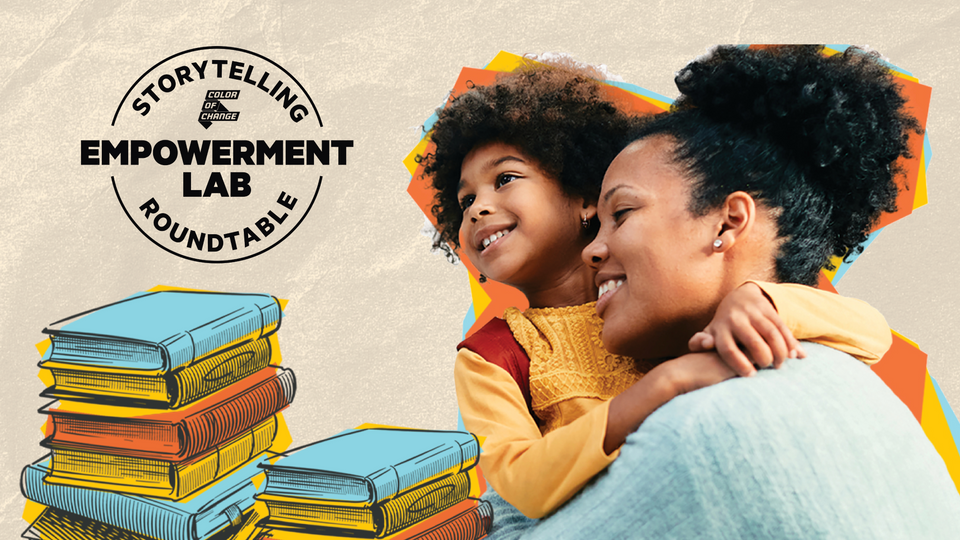COC training empowers people to use their voices to #DefendBlackHistory

By Color of Change staff
People from Boca Raton to Birmingham and Denver to Los Angeles leaned into their power and crafted their personal stories into narratives for social change at Color Of Change’s recent “Empowerment Lab: Storytelling Roundtable.”
The virtual training session, held Oct. 14, was designed to better equip students, parents and educators on how to show up confidently at their local school board and city council meetings to share their stories.
As right-wing groups and politicians escalate their attacks to erase Black history from classrooms and Black and gay authors from libraries, COC members and allies across the country are fighting back by showing up at local school board and other public meetings to demand that school curricula and libraries include and accurately reflect the history, struggles and contributions of Black people in America.
Since January 2021, 18 states have imposed legislative or policy bans or restrictions on teaching critical race theory or to limit how teachers can discuss racism and sexism in the classroom. Similar legislation or policy restrictions have been introduced in 26 other states, according to an Education Week analysis.
Florida’s “Don’t Say Gay” law and “Stop W.O.K.E. Act” have banned lessons on race, gender identity and sexuality and force students to be taught distorted versions of slavery, the Civil War and Reconstruction.
That pattern is continuing in states like Arkansas, which has refused to offer the AP African American Studies course to students for high school credit or to pay for students enrolled in the course to take a test for college credit. People in a few jurisdictions have successfully pushed their local school boards to ignore the state policy.
During the past year, PEN America also recorded more than 3,300 instances of book bans in public school classrooms and libraries. From July 1, 2022, to June 30, 2023, these bans removed student access to more than 1,500 various titles, including largely the works of Black and LGBTQ authors and people of color. Books by Toni Morrison, whose work has been recognized with the prestigious Nobel and Pulitzer prizes, are among the banned titles.
“I can tell you firsthand that our students deserve access to a quality education, accurate history and more care in the education system. It seems like far too often our students are getting the short end of the stick,” said Destanie Newell, a senior regional field manager with COC and an organizer and facilitator of the Storytelling Roundtable.
She said many people attended the storytelling training because they understand a lot is at stake.
“Restricting conversations about systemic racism disempowers the next generation of leaders,” Newell said. Through the workshop, “we want to empower Black parents, students, educators and community members to have control of their narratives and to tell stories that build power in this current political climate,” she said. “There is so much power in sharing our stories.”
Empowerment Lab: Storytelling Roundtable grew out of COC’s virtual School Board Training sessions held during the summer. In those two sessions, more than 200 people learned about the public comment process at local school board meetings and how to organize and develop talking points to present at those public meetings.
COC staff worked with four leaders from those sessions who focused and streamlined their stories to present at the October Storytelling Roundtable.
Monti Taylor, a COC member from Columbus, Ohio, talked about an epiphany she had while waiting in line to vote recently. Her young son accompanied her. When he asked what was being voted on, she told him the issue on the ballot and talked about the importance of voting, she recounted. He responded, “Oh, yeah, to protect Black women.”
He went on to say that Black women need more protection because they “have it worse,” Taylor said.
She said she realized his words were a reflection of the many discussions he heard her have about the disparities Black women face — in childbirth, education, housing and other areas.
“I knew at that moment that I must not only fight for critical race theory and Black studies in my own academic journey, but also to ensure that my son had access to quality education and to be taught accurate history,” Taylor said. “If something were to happen to me, who could I depend on to make sure he is still aware of the many issues that are impacting marginalized communities of the world?
“It is only when you study the issues that impact marginalized communities and Black people the most that we can really put forth true policies and true solutions to help them overcome these challenges,” she said.
Use your voice to ensure quality education for children by defending Black history. Here are several ways to make an impact:
- Record and share your story about why accurate Black history must remain in the classroom.
- Sign COC’s petition telling International Baccalaureate and Cambridge Assessment to stop erasing Black history from the courses and curricula they sell to school systems.
- Reserve your spot in one or both of COC’s upcoming #DefendBlackHistory training sessions hosted in conjunction with the National Education Association. The 90-minute #DefendBlackHistory School Board Training on Tuesday, Dec. 5 will provide the tools needed to build collective power within the community to fight against the erasure of Black history. Special opening remarks will be offered by COC President Rashad Robinson and NEA President Rebecca S. “Becky” Pringle. In the 90-minute #DefendBlackHistory School Board Storytelling Training on Wednesday, Dec. 13, participants will learn how to craft their narrative, address the issues at stake and demand more for our students from their local school boards.

